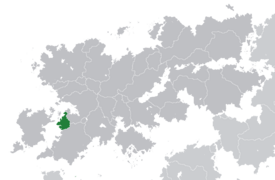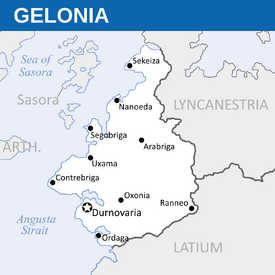Gelonia
Kingdom of Gelonia Rouantelezh Gaelonia (Gelonian) | |
|---|---|
| Motto: Frankiz pe Marv ("Freedom or Death") | |
| Anthem: Kanaouenn e Hon Tadoù Song of Our Fathers | |
 Location of Gelonia (dark green) – in Belisaria (dark grey) | |
 Political Map of Gelonia | |
| Capital | Oxonia |
| Largest city | Dournfawr |
| Official language and national language | Gelonian |
| Recognized languages | |
| Ethnic groups (2018) |
|
| Religion |
|
| Demonym(s) | Gelonian |
| Government | Unitary parliamentary constitutional monarchy |
• King | Arthur XI |
| Adiuni Kloarec | |
| Klara Jezequel | |
| Legislature | Bodadeg |
| Formation | |
| 300 CE | |
• First Kingdom | 1050 |
• Prince-Electorate | 1583 |
• Second Latin conquest | 1632 |
| 17 May 1945 | |
• Second Kingdom | 2 January 1950 |
| Area | |
• | 77,696 km2 (29,999 sq mi) (nth) |
| Population | |
• 2018 estimate | 10,431,981 |
• 2017 census | 10,001,981 |
• Density | 134.26/km2 (347.7/sq mi) |
| GDP (PPP) | 2018 estimate |
• Total | $365.3 billion |
• Per capita | $35,022 |
| GDP (nominal) | 2018 estimate |
• Total | $343.1 billion |
• Per capita | $32,891 |
| HDI | 0.873 very high |
| Currency | Korora (£) (GLK) |
| Date format | dd/mm/yyyy (CE) |
| Driving side | left |
| Calling code | +421 |
| ISO 3166 code | GE |
| Internet TLD | .ge |
Gelonia (Gelonian: Gaelona) is a sovereign state located in western Belisaria, covering an area previously inhabited by Celtic tribes before the period of the Latin occupation. During the Crisis of the 11th Century, it became an independent kingdom, and then a prince-electorate within the Holy Audonian Empire until it was reabsorbed into Latium in 1632, and achieved independence in 1945. It is bordered by Lyncanestria to the north, to the south and east by Latium, and a maritime border with Arthurista. The official and national language is Gelonian.
In the late 1st century AD, the first kingdom of Gelonia was established by Celtic tribes in what is now northwestern Latium and southwestern Lyncanestria due to the encroachments of the advancing Latin Empire. It was absorbed into the Latin Empire by the 3rd century, and remained a Latin province until the Crisis of the 11th Century, when it reasserted its independence. The second kingdom faced threats from many forces, including the Latin pretenders in Adrianople, Caliphate of Alba, Imperial remnants in Alexandria, and the growing Audonian Empire. Eventually, Gelonia entered into the Holy Audonian Empire, and held the status as a prince-elector from 1583 until 1632. Gelonia once again fell under Latin control during the Belisarian Wars of Religion where the Gelonian crown was abolished and the province reorganized into various counties. Various attempts were made in the 19th and early 20th centuries to established a Gelonian community within Latium. In 1945, the Gelonia declared it's independence from Latium in the Gelonian War of Independence, which concluded in an independent Gelonia in 1950.
The sovereign state of Gelonia is a constitutional monarchy under a unitary parliamentary system. It is a developed country with a reasonably high standard of living. It's capital is Oxonia, while it's largest city is Dournfawr, formerly Durnovaria until the Gelonian renaming policies of the 1950s. Gelonia is the Xth largest economy in the world, which is dominated by service and industrial sectors. It is a member of the Forum of Nations.
History
Geography
Climate
Topography
Flora and fauna
Politics and government
Gelonia is a unitary constitutional monarchy with a democratic parliamentary political system. The Monarch is the head of state and appoints the Prime Minister, who in turn nominates members of government. The poltical framework is laid out in the 1950 constitution, which includes a separation of powers and delineates civil liberties and rights. The constitution can be amended by a three step process including, two-thirds vote of the Bodadeg, Royal Assent, and popular referendum.
Monarch
The Monarch is the head of state and commander-in-chief of the armed forces. He can declare war and peace, negotiate and assent to treaties once passed by the Bodadeg, convene and close legislative sessions, call and postpone elections, and dismiss government and dissolve the Bodadeg. Any dismissal and dissolution of the Bodadeg must then receive a vote of no confidence from a majority of the Bodadeg. The Monarch holds veto power by the prerogative of withholding Royal Assent to a bill passed by the Bodadeg, but any denial of assent can be overturned by a two-thirds vote of the Bodadeg.
The current monarch is King Arthur XI, who has reigned since 19 September 2005.
Bodadeg
The Bodadeg, or Gelonian Assembly, is the national unicameral legislature of Gelonia that holds oversight authority. The Bodadeg consists of 167 members elected from single member constituencies by instant-runoff voting with elections every four years. Legislative powers in Gelonia are considered robust, as the Bodadeg can conduct inquiries into government action, and pass motions of no confidence. The Bodadeg may issue motions of no confidence in a government, but the two step process requires Royal Assent in order for the government to be dismissed. The Constitution lays out the circumstances where the Bodadeg may be dissolved; only the Monarch retains the ability to dissolve the Bodadeg. While the monarch has the power to declare war and peace, no declaration is binding without a majority vote of the Bodadeg.
Executive power is constitutionally held by the Monarch, though many daily government functions are handled by the appointed government. The Monarch appoints the Prime Minister, who in turn chooses ministers to serve in government. The constitution requires that the Prime Minister, and government ministers be sitting members of the Bodadeg. Unlike some constitutional monarchies, government is accountable to both the Bodadeg and the Monarchy of Gelonia, and the Bodadeg can force a government minister to resign by interpellation.
The Bodadeg has been dominated by the Labour Party, Modern Democratic Party, and Soudarded since 1955. Since 1987, all governments have been controlled by either the Labour Party or Soudarded. After the 2015 election, Soudarded controls a majority of the Bodadeg with 86 seats. The opposition is led by Labour Party, which holds 72 seats. The remaining seats are held by the Modern Democrats with 8 seats, and a single seat held by the Green-Ecology Party.
The current prime minister is Adiuni Kloarec, leader of Soudarded, who was first appointed on 18 June 2015.
Law and criminal justice
The judiciary is independent of the executive and the legislature. There is no single supreme court, but instead two. The Supreme Court of Cassation is the court of last resort for all civil or criminal matters. The Constitutional Bench is the court of last resort for all administrative cases, and constitutional challenges of statutory law, which can include national or local laws. The Constitutional Court is empowered to ensure conformity with the constitution, and may invalidate royal decrees and legislation if deemed unconstitutional.

